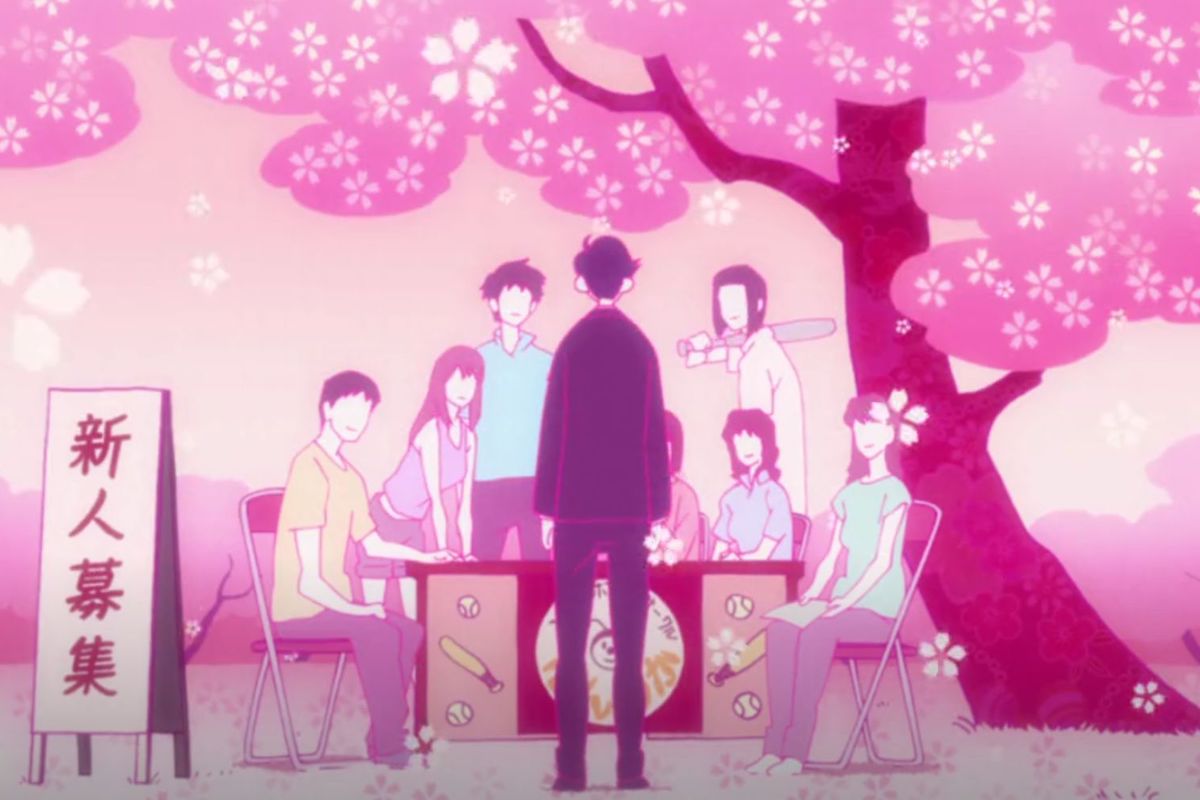I did not enjoy my college years. I did not make many friends and I did not attend many parties. My weekends consisted of washing dishes in the cafeteria until midnight and then huddling in a corner rewatching Buffy while fried food crusted on my soaked jeans. I obsessed over Radiohead and posted terrible Supernatural fanvids on YouTube so that I could avoid having to think about my burgeoning mental illness and how much I regretted not just my choice of major but my choice of alma mater. Seriously, why does anyone give a flying shit about football?
But if a whimsical god one day sat down beside me at a ramen stand and offered me the magical opportunity to redo my college experience and make better decisions, my response would be a shrill and immediate “No!”
Because however miserable my overall experience, my university also happened to offer a full-ride scholarship to students accepted into the Clarion Writing Workshop. If I had not gone to my exact university at that exact time under those exact circumstances, who knows when or if I would have become a novelist?
And besides, college is destined to be disappointing. The overhype is real. Parents and mentors regale their kids with varsity stories of young love, success, failures and faux pas. Eager grandads buy their still-gestating grandbabies Big Ten jerseys. For some families, tailgating is a form of pilgrimage. Over holiday dinners, drunken uncles make smirking allusions to mischief they engaged in as underclassmen. Movies deify the terrible behavior of alcoholic frat boys while courts (not often enough) prosecute them. All of this noise contributes to the upbringing and expectations of countless American children (although of course not every family has access to secondary education and the system is broken and—well, that’s a whole ’nother can o’ worms.)
Literature is just as guilty. We read again and again that being nineteen is formative, that after high school we will suddenly discover and nurture our hidden genius or at the very least fall in love and, ultimately, achieve some weird unspoken enlightenment by graduation.
The College Years as a concept attains a tantalizing mythos. Eventually young people come to believe that the collegiate era is emphatically other, an epoch that somehow exists outside of the wider scope of a lifetime. If a lifetime is the Earth, then college is the moon.
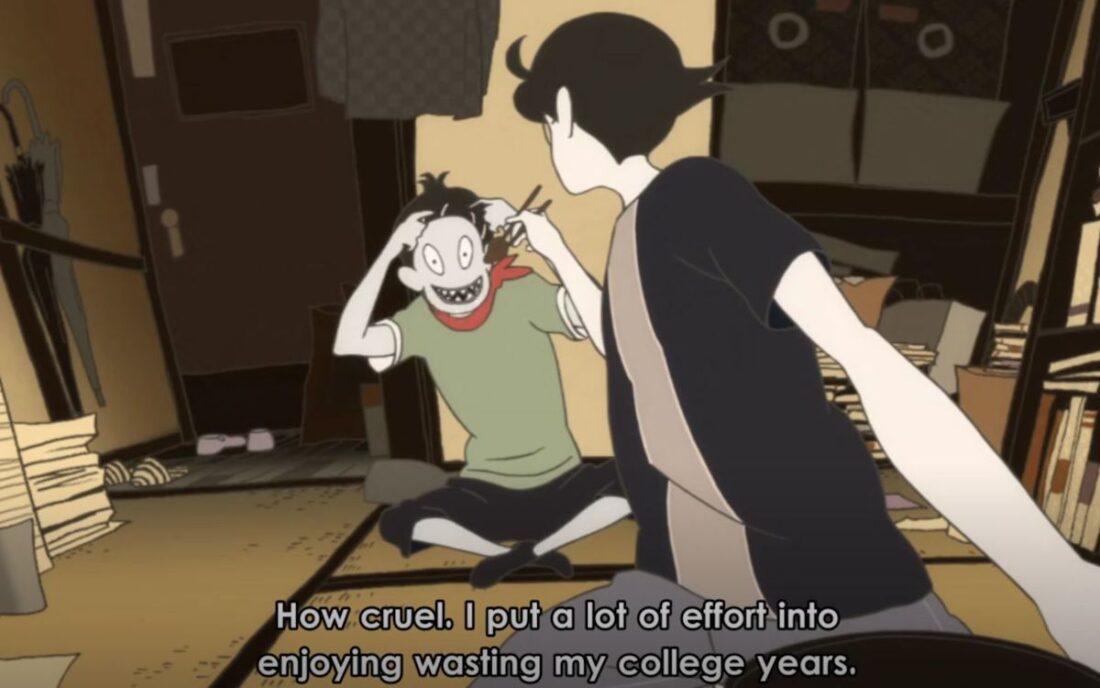
Young adulthood is fundamentally a weird, transitional time during which decisions have rippling repercussions, where identity can be established or destroyed. Yet in those brief manic years between high school and “true” adulthood, society expects teens to become fully-functional self-sufficient creatures. Is it any wonder that young people fall into the trap of thinking their future selves will be responsible enough to cope with the misguided choices of their current selves? We are all primed for delusion.
Fortunately, where there is delusion there is also sometimes art, and few works encapsulate the disillusionment with the collegiate dream so aptly as surrealist anime dramedy The Tatami Galaxy.
Welcome to The Tatami Galaxy
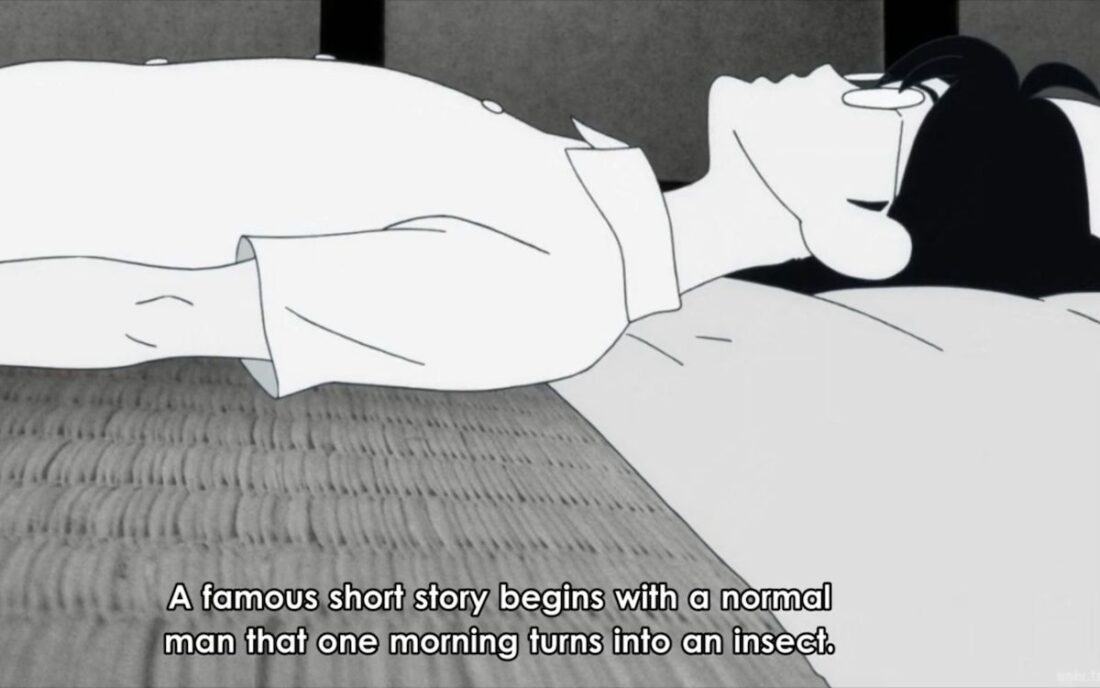
Magical realism has undergone many definitions and, perhaps fittingly, failures to define it. As a specific literary movement, it remains the jurisdiction of Latin American authors, but nearly every culture nurtures its own unique form of something similar, in the sense of fantastical stories in which magic is an accepted part of the world, unexplained and often unremarked upon by the characters who encounter it, manifest it, or contend with it.
Storytelling that presents magic as an inherent part of life is downright common in Japan, a country that nurtures a robust conglomeration of ancient and modern folklore. I cannot wait to write more about the ghosts and monsters of Japan (expect articles on Shigeru Mizuki, Natsume’s Book of Friends, and Mushishi in the future!), but The Tatami Galaxy is not a youkai story. This series is its own unquantifiable thing, a deliberately absurd and inexplicable coming-of-age story that is definitely speculative but also magical.
Based on a varsity novel written by acclaimed author Tomihiko Morimi, the anime adaptation of The Tatami Galaxy was directed by anime auteur Masaaki Yuasa, known for everything from a bizarro Netflix modern cult classic adaptation of Devilman Crybaby to critical gems like Ping Pong the Animation and Keep Your Hands Off Eizouken!
The premise is straightforward enough:
The nameless protagonist (from here on in I’ll call him Watashi), while bemoaning his poor life decisions over ramen, meets a large-chinned man named Higuchi-san who may or may not be the god of matchmaking, and this meeting somehow grants Watashi the opportunity to relive his college years. Watashi chooses to go back to his first day of undergrad and pick a different student club to join, sending himself down a different leg of the trousers of time in order to pursue his ideal rose-colored campus life. Inevitably Watashi utterly fails to improve his lot, and goes back in time once again and chooses a different club again…and again, and again, only to end up just as dissatisfied in every newly chosen universe.
It isn’t clear how aware Watashi is that he is caught in a loop of humiliation. Beyond meeting Higuchi-san at the ramen shop in episode one, no proper explanation is given for the conceit that allows Watashi to try on another universe; each episode starts back at the beginning and ends with a clock turning back time.
The myriad universes Watashi occupies are not definitely magical, but they are surreal. Over the course of the series, Watashi joins a tennis circle, becomes trapped in a honey-obsessed doomsday cult, babysits a sex doll for a riotous upperclassman, sabotages a film club, dresses as a TV mascot for a super sentai series, works for a Kafkaesque library police squad, crashes an airship, and has the inside of his mouth groped by a dental student after a night of drinking goes awry. Nothing is entirely impossible, but everything is highly improbable, bordering on zany, anchored only by repeating motifs, characters, phrases, and settings.
A classmate’s missing keychain hangs from Watashi’s lamp in every lifetime. A stale castella gifted by a frenemy is omnipresent in his 4.5 tatami mat apartment. No matter the universe, Watashi always narrates his life events at a pace so rapid that even Japanese-speaking viewers may have to pause the anime and listen again. Watashi is always pursuing an idealized raven-haired beauty who does not exist. He always meets a fortune teller who raises her prices with every subsequent episode. And always, Watashi ends each episode convinced that if he could just try reliving his campus life one more time, he would get it right.
Eventually Watashi finds himself trapped inside a labyrinthine maze of his own parallel 4.5 tatami apartments, and the mirrored rooms of all his possible lives lock him in a cage of straw mats and garbage and castella and regret and voila! The story earns its fantastic title.
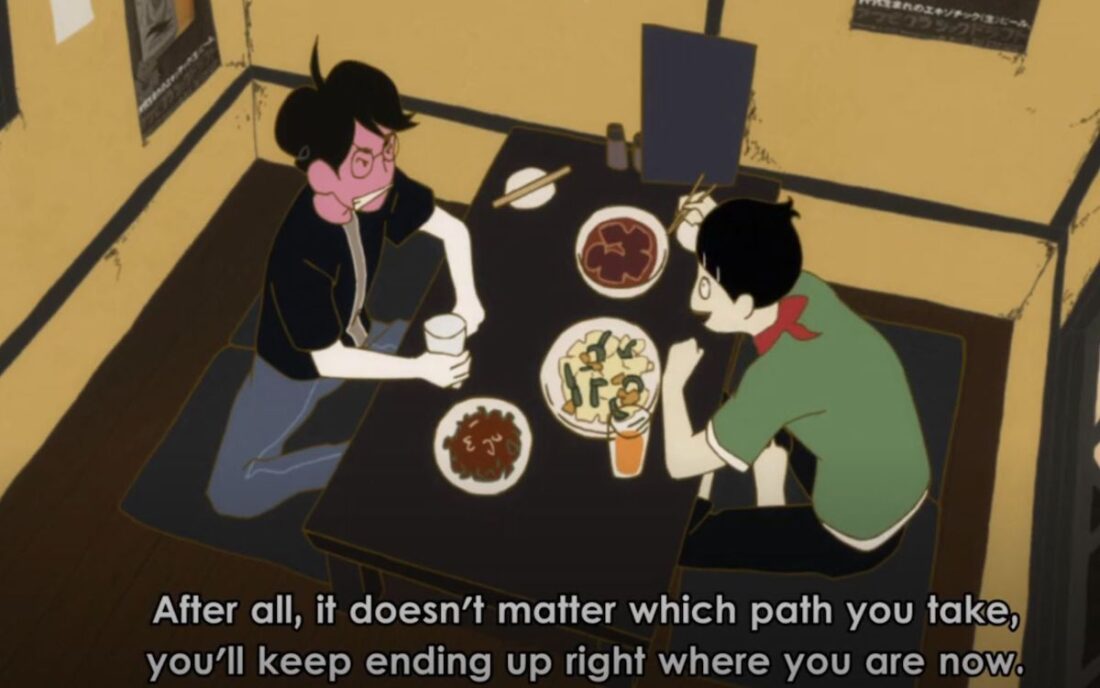
The Tatami Galaxy, odd and colorful and absurd as it is, is not unpredictable. The audience knows from episode one that no single club is going to lead Watashi to happiness. Obviously, Watashi is unhappy being himself, and we all know the ideal college life does not exist, and obviously Watashi needs to return that damn keychain to that badass girl Akashi and ask her out because she is the single best recurring aspect in each and every one of his endless flubbed lives.
But if the conclusions are obvious, what makes this story so compelling? Why is The Tatami Galaxy widely considered a modern arthouse masterpiece? There are many reasons, and an essay is too short a format, and arguably the series is not beloved so much as it is admired, but I am lucky enough that I get to share some of my favorite elements of this singular show right here and now in a speculative fiction anime column, so ha! There!
Ozu’s Curse
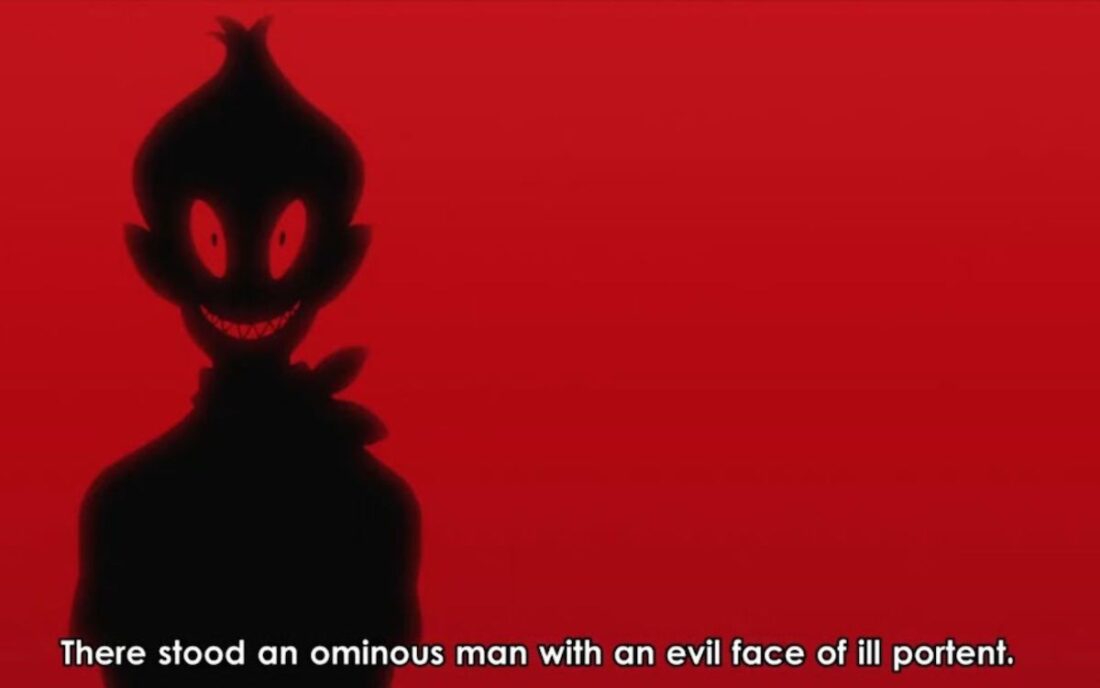
Throughout the series, it is all too easy for Watashi to blame his woes on a single presence that invades all of his lives—his classmate Ozu, a weird little weasel of a guy who may not even be a human being: “My soul would surely have stayed unblemished had I not met him.”
But who or what, precisely, is Ozu? He is drawn with the spooky features of an actual yōkai, and sometimes even depicted as a wolf. He hates vegetables and loves mischief and seems privy to details about Watashi’s parallel universes that the audience isn’t even aware of. Ozu has sneakily cornered the dramatic irony market.
When Watashi asks, time and again, “Why do you haunt me so?” Ozu always answers, “It’s the way I show my love.”
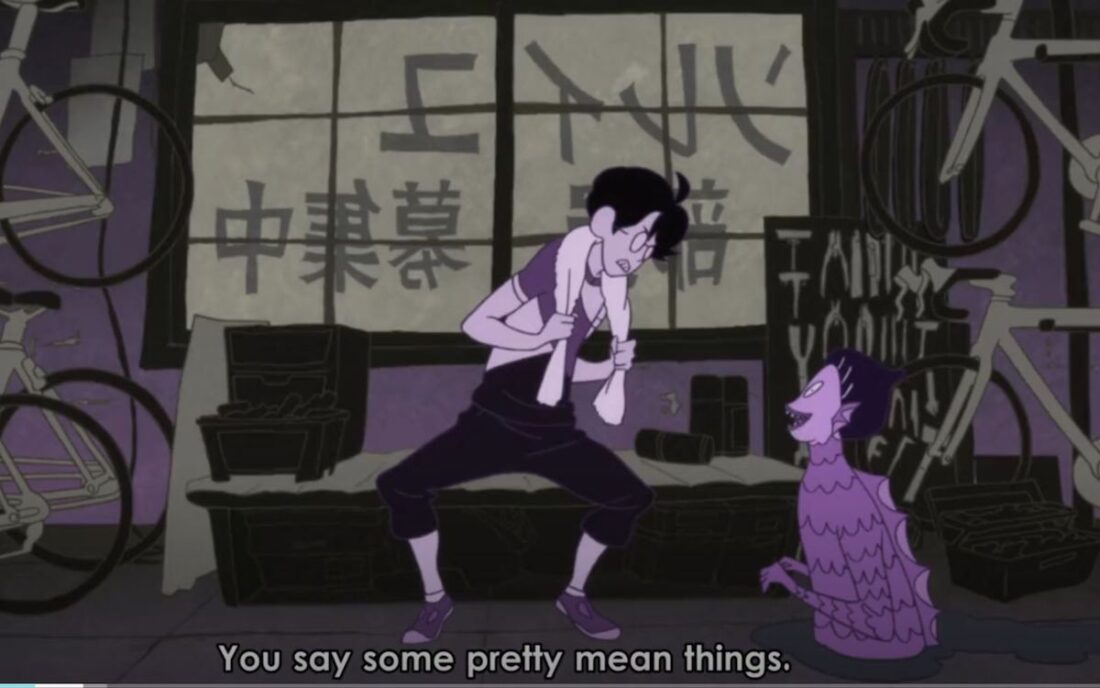
Ozu claims to be tied to the protagonist by the black string of fate, and indeed no matter what path Watashi takes, Ozu is always his reliable companion. It is Ozu who inspires Watashi to sabotage the romantic partners in the tennis circle, and Ozu who convinces another classmate to pretend to be a raven-haired pen pal in order to catfish Watashi. But it is also Ozu who tolerates Watashi’s endless insults and complaints, who brings Watashi a castella when he is sad.
Perhaps Ozu is a pain in the ass rascal of a college guy having too much fun making messes and living in the moment, or perhaps he is a demon from the underworld who is intent on tormenting the protagonist. Really, it doesn’t matter, because if nothing else Ozu is consistent.
The friends we make in our university years are often those who exist in close proximity to us; the roomie we put up with, the students studying in our majors, that one guy who hands out fliers in the lobby. It is rarer to find true friendships that run deeper, and whatever else may be true of Ozu, he is undeniably loyal to Watashi.
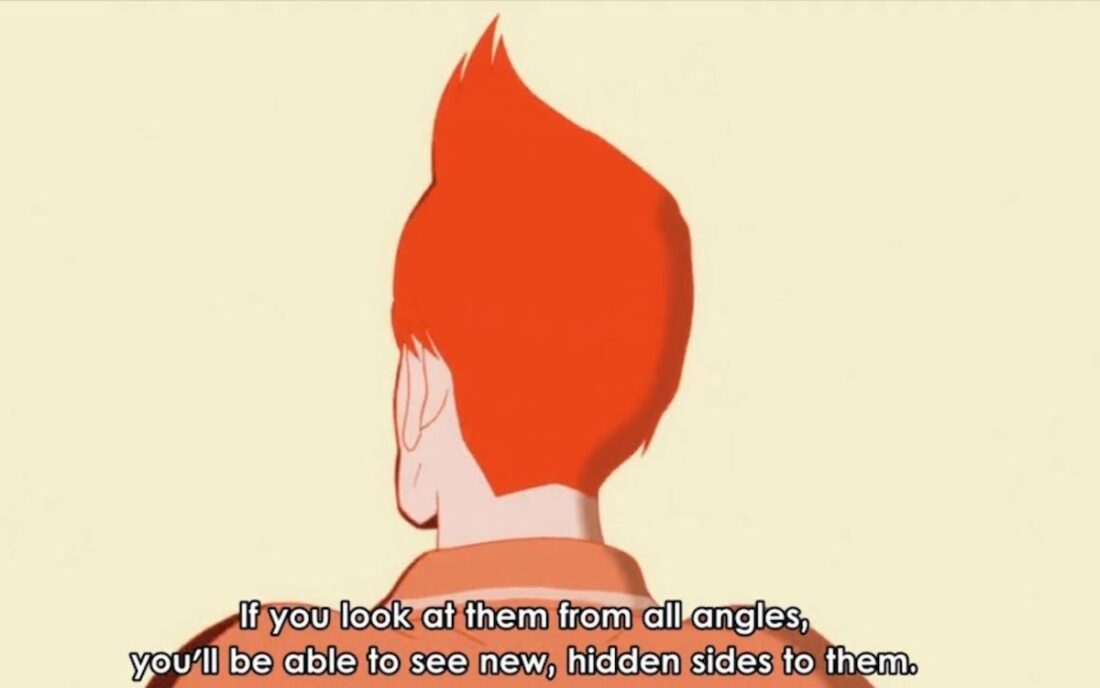
Watashi’s failure to see Ozu as a person rather than a menace ultimately says more about Watashi than it does about Ozu.
In fact, Watashi’s failure to see any other people as fully three-dimensional beings in their own right, rather than characters in the story of his own life, is likely another biting critique of a prevalent campus-life mindset.
Akashi
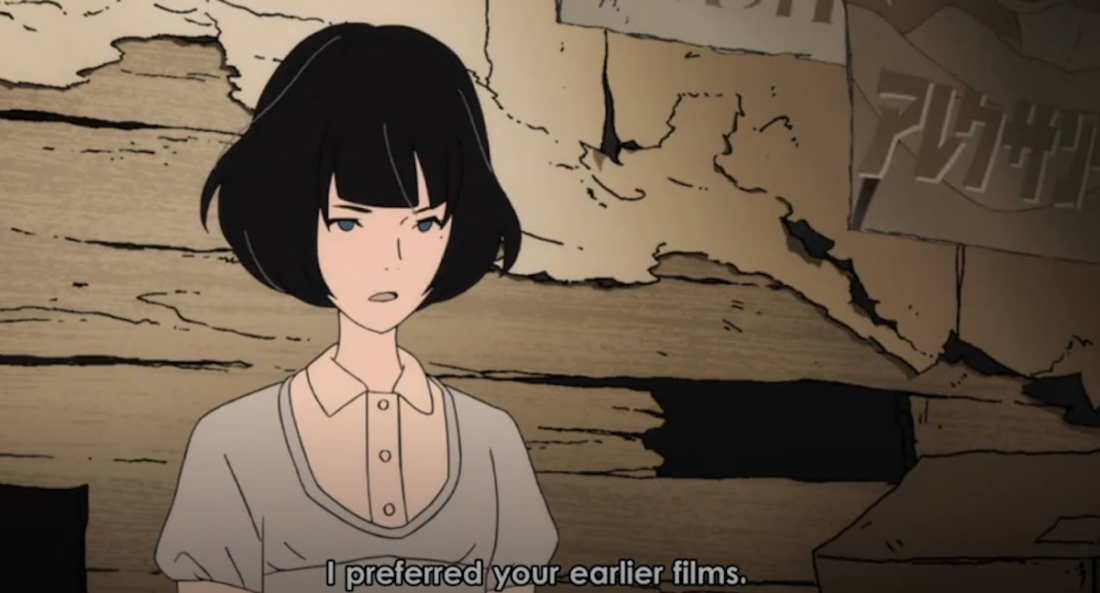
Ozu is not the only casualty of Watashi’s self-centered headcanon.
Akashi is an engineering student and the obvious romantic interest in this story, but this story isn’t really a romance. Akashi is blunt and outspoken, a little odd, and her trademark attributes are her fear of moths and her beloved mascot keychains.
It might be a fair criticism to call her a flat character, but that is only if the audience views her through Watashi’s limited lens.
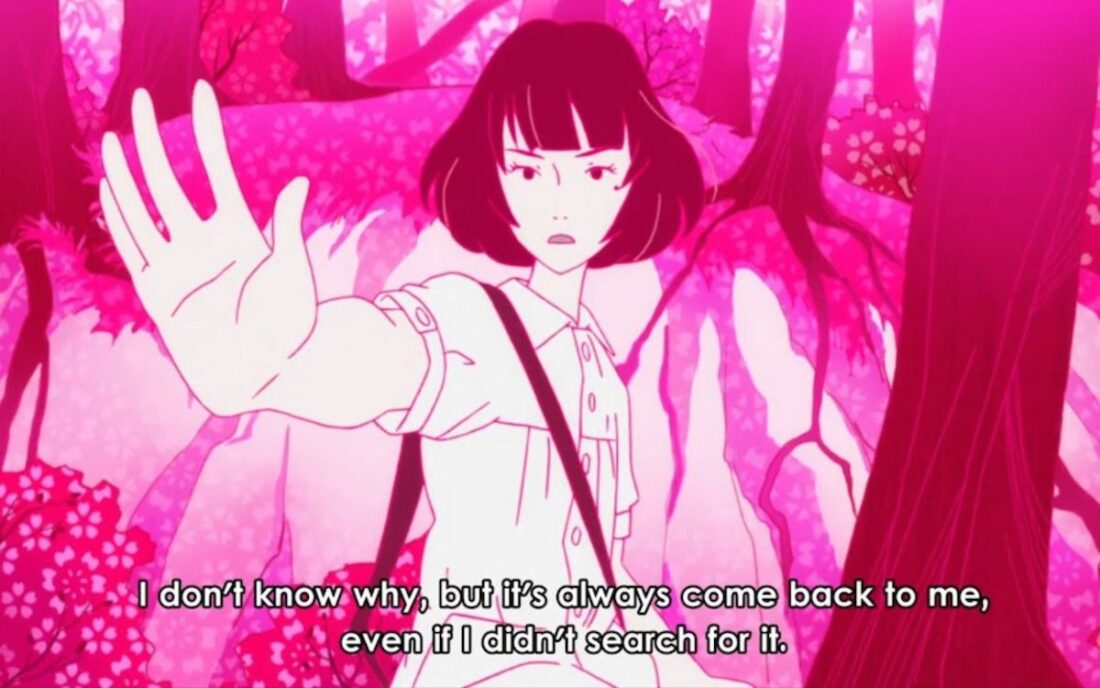
Any illusion that Akashi is less than a fully-realized person is gradually, cleverly dissolved as the series progresses. In every universe that Watashi experiences, Akashi is doing her own thing, often up to shenanigans or engaging in deceit herself, living in her own adjacent universe that could be its own tatami galaxy. Even though self-absorbed Watashi fails to see the nuances and charms of Akashi at many turns, just as he fails to appreciate Ozu as a friend, the audience appreciates Akashi and her forthright nature from the start.
The Matchmaking God?
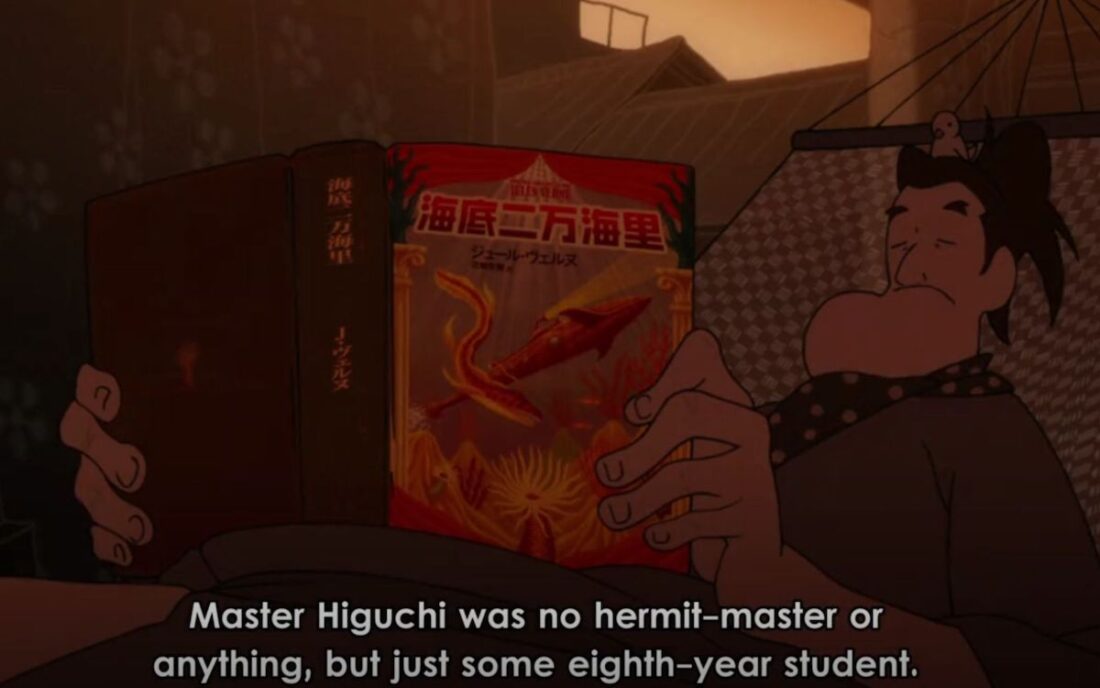
Last fall I took a little road trip with some coworkers to Izumo Taisha, thought to be the oldest shrine in all of Japan, and also the resting place of a Shinto creation god known as Ōkuninushi. Izumo Taisha is also thought to be a fortuitous place for couples to visit if they’re hoping for healthy matrimony. In November it is said that all the gods convene in Izumo for an annual meeting. Priests greet the gods as they arrive on Inasa Beach and guide them to their temporary lodgings on the shrine grounds. During this time, it is said that Izumo is extremely godly and the rest of Japan is momentarily godless, a land devoid of heavenly powers.
College has an insulating effect on many young people, and it can feel as though the rest of the world does not exist, or that the moments taking place in the microcosm of a campus or college town are all-encompassing. When Watashi meets Keitaro Higuchi at Neko Ramen in the first scene of the series, Higuchi claims to be a local god who will be attending the annual meeting in Izumo. Later we learn he may be just an eighth-year burnout student. What’s the truth, and does it matter?
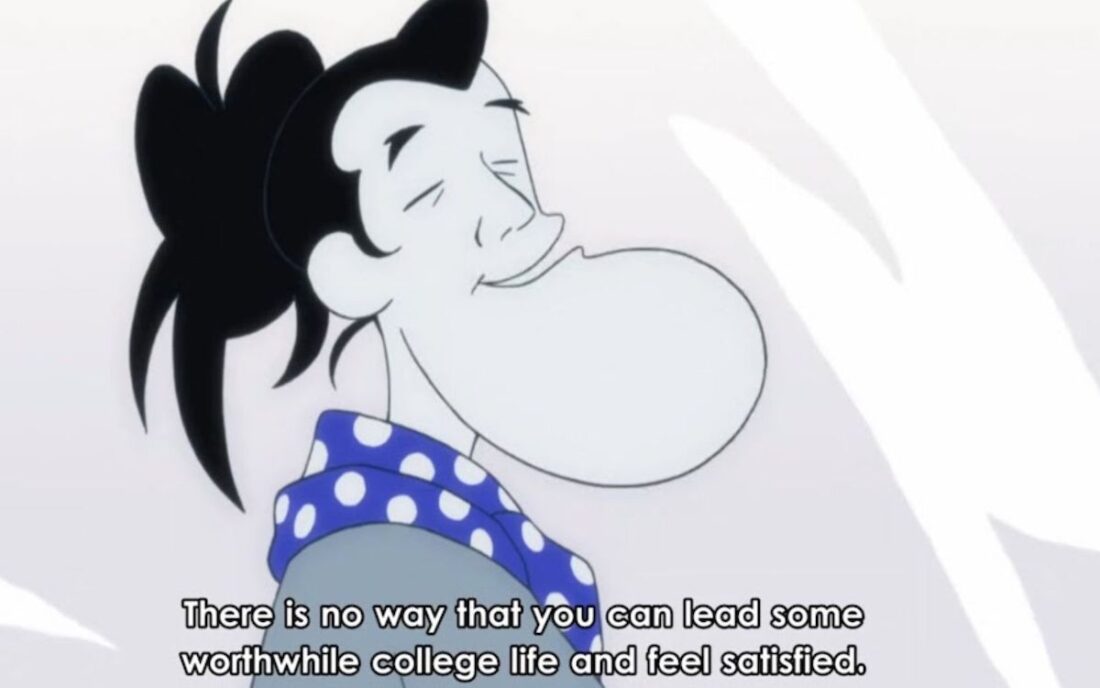
Higuchi is the catalyst that sends Watashi scrambling to change his past. Higuchi, somehow, embodies both heavenly omnipotence and slacker ethos simultaneously, and he delivers words of wisdom throughout the series. Godly or godless, he gets things moving.
The Art of a Claustrophobic Multiverse
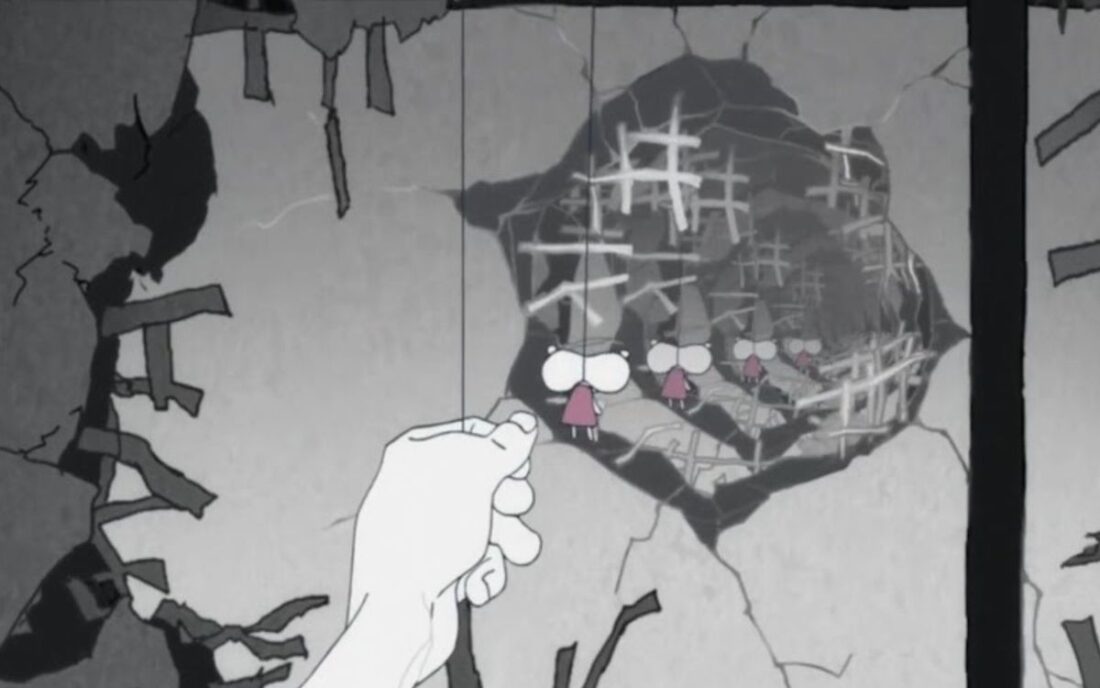
It is impossible to talk about this series without bringing up the artistry. No anime has ever looked like The Tatami Galaxy, which uses a unique combination of highly stylized art, rotoscoping, live-action footage, and classic cartooning throughout. This is a show that can be recognized instantly based on any single screenshot.
Director Masaaki Yuasa is arguably the king of arthouse anime, and with screenwriter Makoto Ueda adapting Tomihiko’s quirky novel, the show stands as a semi-transcendent piece of television. Madhouse, Inc., the animation studio, has established a solid reputation for producing groundbreaking anime (see also: the sublime films of Satoshi Kon, Death Parade, Trigun, Frieren, Death Note, etc.). And with character designs from iconic illustrator Yusuke Nakamura, perhaps best known for his album art, it is hard to imagine this series being created by a more accomplished artistic team.
The tatami multiverse in which Watashi finds himself ultimately trapped is simultaneously expansive and painfully claustrophobic. The creators wanted the show to feel as unique as the protagonist longs for his life to be, and when this all culminates in the repetition of endless tatami rooms reaching into infinity, the effect is dizzying, impressive, and depressing all at once. These creators and this studio with this story formed a perfect marriage.
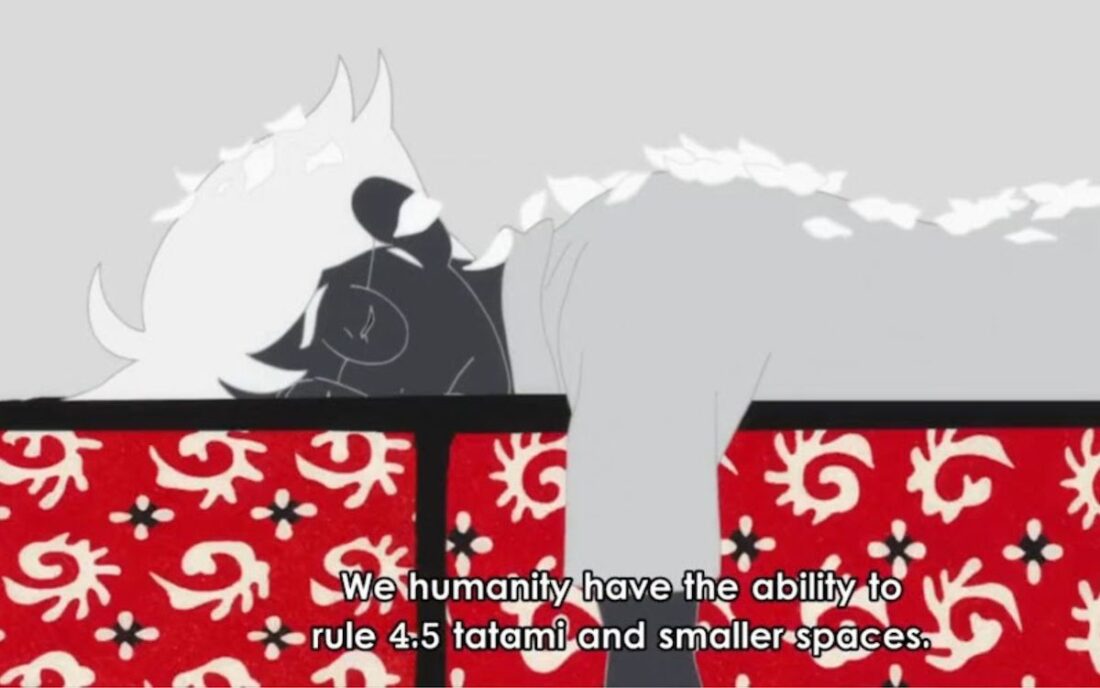
When the multiverse is reimagined as a series of tatami mat apartments, each one has been altered ever so slightly by the protagonist in that world’s decisions. Watashi breaks through wall after wall only to find himself alone in each room, and as he wanders he survives on instant coffee and the stale castella Ozu gifted him in every existence.
It takes being truly stuck inside with his own ego for Watashi to realize how little he appreciated the miniscule, meaningful wonders of every life he ever lived. To the version of himself trapped inside the labyrinth, every parallel version of himself appears to be living a fun, full campus life. All his failures and doomed club experiences appear fantastical. Watashi envies the exact versions of himself that considered themselves miserable in every episode prior.
So much expectation is placed on the college experience that they are inevitably a letdown for many, if not most, people. But that’s probably okay. Even the sucky, worthless moments are vital; they too are part of what comprises a life. Growing up does not mean emerging fully-formed from the cocoon of college; growing up is a never-ending, arduous process, and requires us to relinquish any expectation of controlling what the world will throw at us. There’s a fine line between indulging in toxic nostalgia and appreciating the mess that is young adulthood. We can either regret the choices we made or delude ourselves that we lived a fabulous campus life or, maybe, realize it does not matter and appreciate it for what it is.
After all, no matter what choices we made, we were always going to be ourselves.
Kyoto, I Love You
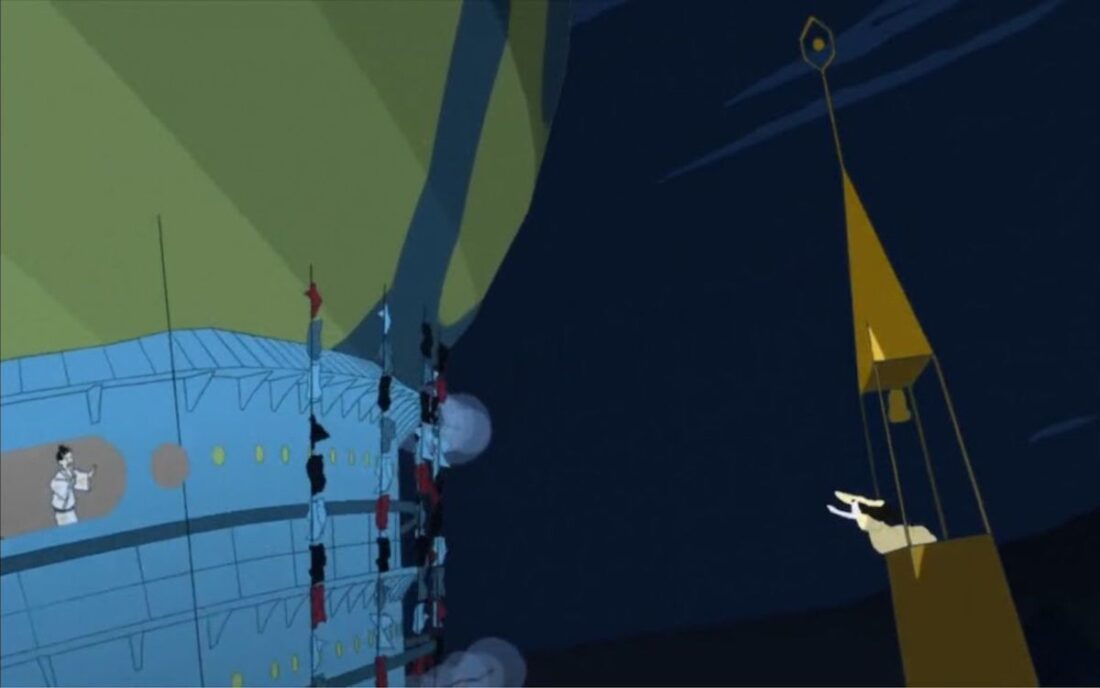
Author Tomihiko Morimi is a proud graduate of Kyoto University, and his novels are often based in Kyoto (I will be writing about his other masterpiece, The Eccentric Family, and its anime adaptation in the near future). Kyoto is Japan’s former capital, and while recently it’s been in the news because the yen is weak and tourists are misbehaving on the storied streets of Gion, Kyoto maintains a little aloof. An almost otherworldly atmosphere sets it apart from most famous cities. The cobbles are old and careworn, the temples renowned, the gardens ethereal. Old traditions have not left this city, even as newcomers move in. Kyoto changes people, and not the other way around.
It is the perfect setting for a story in which time and space are not behaving as they usually do.
Throughout The Tatami Galaxy, Kyoto is another unspoken constant. In parallel lives, Watashi gets wasted along Pontocho alley, sets off fireworks along the Kamo River, and finally, when he appreciates the selves he abandoned and emerges at last from his tatami prison, trailed by an infinite cloud of moths, Watashi realizes that it is August.
Watashi looks down the alleyway and sees a family lighting fireworks. The Daimonji Gozan Okuribi festival is underway. For once, all his narration stops. Watashi goes quiet and stares in open wonder at the mundane world outside his own head.
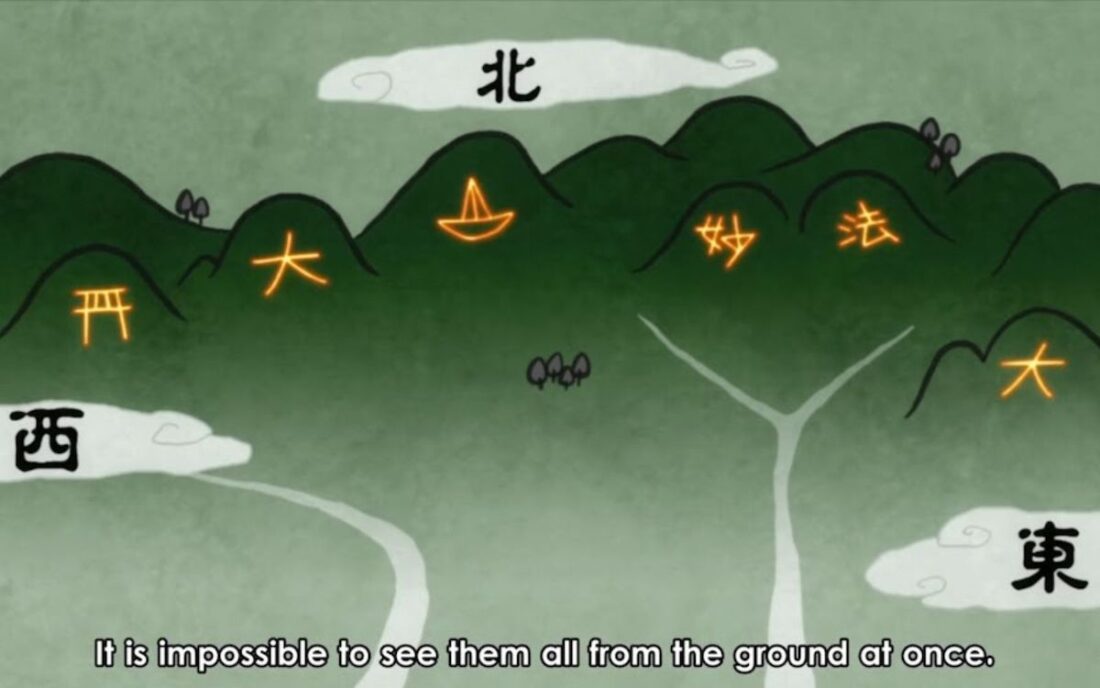
During the festival, enormous bonfires are traditionally ignited on the mountainsides that surround the city. These bonfires signify a farewell to ancestors at the end of the Obon season, a fiery tribute to lives already lived. And no matter where a person stands in the old city, no one can see all of the burning characters at the same time.
No one but the gods can be everywhere or everything at once. Eventually, you have to learn to be grateful for the view in front of you, despite or because of its inevitable limitations. That’s life, folks, and it is more than poignant enough.
Note from the blogger: Hi, again! I’m Leah, author and long-time otaku currently living in Tottori, Japan. I’m covering anime here on Reactor. Whether you’re a fan already or this is your introduction, welcome!
So… it turns out a single article to cover the anime adaptations of the brilliant Tomihiko Morimi isn’t feasible, so I’ll be writing a separate article on The Eccentric Family soon. However, next time, for a change of pace, expect the next article to be all about the weird, gross brilliance of Chainsaw Man and a reflection on how dystopias have rarely been better settings for coming-of-age stories than they are now. After that, back to Morimi, and then a special look at Delicious in Dungeon, because people keep assigning that show as homework!
Thank you for reading, and for your thoughts! Again, comments, suggestions, discussions encouraged!
In this article:
- The Tatami Galaxy (Madhouse, 2010) Available via Crunchyroll, Amazon Prime, and Hulu.
Up next:

